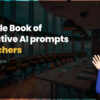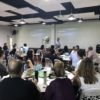

This is a blogpost in line with the April BlogSync project here
How many people in this month’s blogsync are going to use this image in their post? Quite a few I imagine, because like in many classrooms around the country, I suspect progress looks and sounds the same. “They know more now than they did when they came in.” I’d like to think however that we can see progress in many different ways and that we can measure it in a number of different ways too. A student’s happiness in their learning, their ability to apply new learning, their ability to share their knowledge and understanding with others, their ability to regale that knowledge and understanding or that skills 2, 3, 4 weeks, 5 months, 2 years down the line. Progress comes in lots of shapes and forms. The thing is, the phrase that many people think of when thinking about progress in education is the phrase ‘rapid and sustained’ progress.
Recently there has been lots of discussion about this topic, for example here: http://dailygenius.wordpress.com/2013/02/12/the-myth-of-progress-within-lessons/ and here: http://learningspy.co.uk/2013/02/14/can-progress-be-both-rapid-and-sustained/ – and in many ways, I tend to agree with David Didau’s assertions in his post.
For me, rapid and sustained progress is not something that can happen at exactly the same time, but they are definitely things that you can see at the same time when looking in on a lesson when looking at a practitioner’s work. When it comes to rapid progress you can see this in a single lesson context because the practitioner can bring about learning opportunities for this to take place. In a single lesson context however, sustained progress is something which can only really be seen over a period of lessons. If you’re observing a class on a single lesson basis and it’s something you’re looking for, then as a class teacher it is important (and not just for the big ‘O’) that you have good record keeping. See ‘sustained’ section below for an expansion on this.
Rapid
This is the sort of progress that you (should) see in all of your lessons. Students are taking on board new knowledge, practising new skills, sharing new information; turning what for them is essentially data at the beginning of the lesson, be given contextualisation from the resources and support structures you have provided whilst being that ‘guide on the side’ and turning it in to new information. Activities such as those I will go through below will show that rapid progress can be seen in the course of a lesson.
Sustained
Sustained progress is something again which you can see over a period of time if you:
- have good record keeping
- are tracking the work that your students do
- keep a regular pen portrait of the learning experienced by your individual students
- differentiate lessons based upon their needs
- personalise the opportunities in your lesson so that individuals can access the topics
…and this is something I do for all of my classes. It’s important.
Blogsync
In my post for blogsync however, I thought I’d go through one of the ways that I provide opportunities for students to have big progress wins in their lessons with me so that opportunities to learn are explicit, shared, owned by all and demonstrably more powerful than just me being a sage on the stage who tests students at the end of the lesson.
- intended impact
- description of classroom action
- reflection on effect
- measure of impact
I have a class that is completing a Computing course. It is highly technical. I was looking for new ways to measure their performance, check their understanding and support them with opportunities to practice their analytical programming skills away from the actual programming interface. I also wanted the activities to be differentiated with the sky being the limit and for students to know explicitly the topics to be covered, that the audience for their work would be the whole class and that I would be sharing the best pieces of their work with the world at large at a conference I was speaking at. With the scene set, I set them off on a task using the brilliant free tool, Socrative. This brilliant tool allows you to create a number of performance / knowledge / skill tests that can be completed online. There are massive learning wins possible through this tool – I strongly urge you to look in to it.

The Socrative Space race is good for promoting competition
Intended impact
I wanted students to have a real sense of agency in their work. One of my marginal gains targets is to develop communities in my classes this academic year and so, linked with that, I thought that I would be able to do this through my performance/progress checking process, to facilitate performance measurement in a way which was multi-faceted. Not only was I going to create performance checking tests, but they were too. This would create the sense of agency and community within the group. I also thought this would be a great way of checking their knowledge and understanding by them creating their own test, completing the tests of their peers, feeding back on the various tests, the process of actually creating their own tests would also check their knowledge and understanding of the various topics by the very nature of them creating their own tests. Part of the preparation process also involved going through previous past questions to look at the ways in which questions were written, the types of language used and the range of options available on either multiple choice questions or short answer questions.
Description of classroom action
The class both completed and created peer based assessments of each other and some created by me which involved open ended answer questions, multiple choice and questions derived from image response. The classroom action was really powerful. Seeing the students work in this way was something which the class had not explored before, although I have used it to great success with other classes so I was positive it would work with them too. The tasks were broken down in such a way that students had to create at least ten different questions on given topics. Different types of questions had to be included too. Socrative is great with multiple choice questions as it marks them for you, but I knew it was important for the learning process for them to include short answer questions too. They included open and closed question types. My test also included questions derived from image responses – this is an update coming soon to Socrative which I’m able to access currently ( 🙂 ).
Reflection on effect
What was particularly noticeable here was the improved value that the students have been giving to their own learning and reflectiveness in using the tool. I was really pleased to see the improved sense of agency that I’ve seen in the students. I’ve seen this through a number of positive behaviours in the students.
- Students have been completing homework to deadline
- Students were creating more questions than they had to
- Students created increasingly complex questions
- Students created questions that were complex and above the level I would have expected to see them working at given their previous levels and their FFTD target levels
- Students have been more engaged in the learning checking process
- Students have been competitive in terms of their creation and completion of learning checks
- Students have been innovative with their use of the software
- Students have been more cooperative and reflective
Learning from the process the one thing that I would go back on is that I would ask students to create some detailed mark schemes which would elicit different ‘correct’ answers in more detail for their short answer / open ended questions. This would bring out even more learning opportunities which was missing from this activity.
Measure of impact
Is this progress? Has their performance come on further than it would have done otherwise? Some of the questions and sections that the students created quizzes on were actually areas that I hadn’t even covered with them as a class. These were areas that they had taught themselves in order to be able to ask the questions and give the correct answers and mark scheme at the end.
So, going back to the beginning of my post:
- Have I built communities? Yes – students are more engaged, they’ve shown resilience, determination, grit and real character in doing this work both inside and (mostly) outside of lessons – often collaborating with each other on difficult topics.
- Has the sense of agency improved? Yes – students have taken on board a new sense of responsibility and are working in a way that will really help them in their future studies, not just in my lessons but in others too. Students have learned new skills to help practise their existing knowledge using new means and as a result they have new transferable skills which they can employ in other subjects.
- Have the students made progress? Yes – they have made demonstrable progress, further than they would have done if I had just ‘taught them’ – sage on the stage style and then tested them at the end of the lesson.
- Have the students performed? Yes – where there have been inconsistencies in their quizzes, they’ve fixed them. Where there have been incorrect answers in the tests they’ve sat of others, they’ve gone back and done them again to improve their scores. The list of wins continues.
This obviously can’t be the only method for working with the students and getting them to perform and show progress in my lessons, but more on that for the future. For now, the students are doing really well, I’m very pleased with the group and that on top of their developing Computing skills, they are also learning some great transferable skills to help them with their future studies both in and out of my subject area.
Over and out.
Addendum:
Future developments:
What I didn’t include as I thought my post was getting a bit long was some of the other things that took place during this 3 lesson, 1 homework slot.
The planned sequence of sessions was not a co-constructed sequence, however, the way I organised it was done in such a way as to appeal to some of the boys in the class who had not been quite as engaged previously as I would have liked. As many will testify to, the Computing courses at KS4 and 5 are pretty technically demanding and as such I wanted to engage some of the boys who had turned off a little bit to the course. Knowing through some anecdotal evidence that gamification of learning can improve engagement of boys, I thought I’d use this method of working with the group.
The other thing I omitted was the refinement loop that took place during this where we used a musical chairs critique strategy as a means of gaining feedback on questions. Students were given the ‘kind, specific and helpful’ feedback framework and were asked to give feedback to two students in the group, sitting down in their chair when the music stopped and then having a few minutes to go through the quizzes and offer some feedback for improving the various quizzes that they were creating. Students then had the opportunity to go back and refine their quizzes based upon the feedback they had received.
Here are some related posts and videos on gamification that may be of interest:
http://mashable.com/2013/03/08/games-classroom/
Gabe Zichermann’s TED Talk: How games make kids smarter
Professor Henry Jenkins on games-based learning at SxSWi 2009
Integrating Games-based Learning: A Conversation with Tim Rylands















Mark,
The most striking part of your blog post for me was the ‘reflection on effect’ part where you state a number of outcomes that you felt your students had achieved as a result of this lesson. This is where I feel the need to communicate with the observer in the room to highlight the progress being made by your students is really important (as mentioned by David Didau in a recent post). You mention ‘innovative’, ‘co-operative and reflective’ and ‘increasingly complex’ as part of the evaluation and I imagined observing this lesson and wondering whether I’d be able to come to these same conclusions just sitting at the back of your classroom. My answer is probably not as I don’t know the students, so it would need for you to make this abundantly clear to the observer to show your knowledge of them and your awareness of their progress.
I am mentioning this point as it is the Ofsted framework that leads us to examine the phrase ‘rapid and sustained progress’, and I think it is a point worth raising to encourage people to talk to the observer in the room and point these things out, particularly if you know they have the Ofsted criteria and teaching standards in front of them (as some at my school tend to do!).
The issue with the words ‘rapid’ and ‘sustained’ sitting side by side when discussing progress seems thorny. The idea of ‘rapid’ can suggest a lack of depth or opportunity to embed and I would worry that teachers would think it ok to whizz through lessons spoon feeding information to show students can regurgitate in an exam and therefore get the required grade. I suppose it is partly down to how a school chooses to interpret this phrase and whether they indeed wish to use it as part of their internal observations. Alistair Smith’s ‘Ofsted whisperers’ spring to mind…
In your post here, your learning outcomes seem more holistic rather than specific to the syllabus and you can see that their learning traits, e.g. resourcefulness, resilience, etc. have developed which will help them in other lessons. I would be interested to hear about how they are next time you teach them and whether these learning habits are sustained for the duration of your time with them. It would also be interesting to see whether these individuals have developed /shown these skills in other lessons. This is always the issue with secondary timetabling; they have their stint with you, can show desirable learning habits and then move to a colleague’s classroom where the students get away with doing nothing!
You pose the question whether this is progress that you have seen. If you take Keven Bartle’s view from his blog that progress is the measure, I would say that your lesson shows learning of skills to help learning (if that makes sense). Whether you could show this as progress is therefore doubtful as their starting point is anecdotal (based on your perception of what these students could/couldn’t manage before). I think that I’m likely to agree that progress is for the measuring stick of LoP and levels/grades in terms currently set out by the Ofsted framework, but equally you could argue they have made progress in terms of their learning skills – their development and growth – which sits under the word ‘progress’ in the dictionary.
Ultimately, as practitioners in the classroom, we have to concern ourselves primarily with learning, keeping an eye on the progress bar for the sake of our accountability. In theory though, that should mean that if we focus on their learning, we should need not worry about the outcomes as they will take care of themselves? Yet, the drive to hit targets may mean we need to balance the two as carefully as we can to avoid a messy outcome but also keep our own value of what it means to be a learning practitioner.
Wow – I’ve rambled. So much to think about here, but essentially it would be interesting for you to keep us updated with how these students do indeed make progress! I’m not sure I’ve come to any conclusions about the notion of progress and where it sits with learning yet… Comments welcome!
Hi Naomi,
Thank you for your detailed feedback. As it’s quite lengthy, what I’m going to do is copy your comment in to mine and respond to each paragraph in turn.
Naomi: The most striking part of your blog post for me was the ‘reflection on effect’ part where you state a number of outcomes that you felt your students had achieved as a result of this lesson. This is where I feel the need to communicate with the observer in the room to highlight the progress being made by your students is really important (as mentioned by David Didau in a recent post). You mention ‘innovative’, ‘co-operative and reflective’ and ‘increasingly complex’ as part of the evaluation and I imagined observing this lesson and wondering whether I’d be able to come to these same conclusions just sitting at the back of your classroom. My answer is probably not as I don’t know the students, so it would need for you to make this abundantly clear to the observer to show your knowledge of them and your awareness of their progress.
I am mentioning this point as it is the Ofsted framework that leads us to examine the phrase ‘rapid and sustained progress’, and I think it is a point worth raising to encourage people to talk to the observer in the room and point these things out, particularly if you know they have the Ofsted criteria and teaching standards in front of them (as some at my school tend to do!).
Mark: I agree with what you say here. Where I work we have live lesson observations and as such we are well versed at interacting with observers in my classroom. When an Inspector next walks in to my classroom I am going to be well prepared to bring it to them and use the opportunity to show them what I do in my classroom. In my post here however, I wasn’t trying to showcase any kind of uber-lesson by me, but just talking about a series of lessons with one of my groups where I thought I was able to show progress that would be of interest and worth sharing.
Naomi: The issue with the words ‘rapid’ and ‘sustained’ sitting side by side when discussing progress seems thorny. The idea of ‘rapid’ can suggest a lack of depth or opportunity to embed and I would worry that teachers would think it ok to whizz through lessons spoon feeding information to show students can regurgitate in an exam and therefore get the required grade. I suppose it is partly down to how a school chooses to interpret this phrase and whether they indeed wish to use it as part of their internal observations. Alistair Smith’s ‘Ofsted whisperers’ spring to mind…
Mark: I concur, but in my mind, in a public forum, where we are talking about and examining progress, such as we are here in blogsync, I thought it important, especially given recent discussions in blogs and the like, to bring those thoughts in.
Naomi: In your post here, your learning outcomes seem more holistic rather than specific to the syllabus and you can see that their learning traits, e.g. resourcefulness, resilience, etc. have developed which will help them in other lessons. I would be interested to hear about how they are next time you teach them and whether these learning habits are sustained for the duration of your time with them. It would also be interesting to see whether these individuals have developed /shown these skills in other lessons. This is always the issue with secondary timetabling; they have their stint with you, can show desirable learning habits and then move to a colleague’s classroom where the students get away with doing nothing!
Mark: I didn’t actually state what the learning outcomes for the series of lessons were – the holistic outcomes that you refer to were not overt or explicit to the students, although perhaps I should have made them so. Their outcomes were more specifically related to knowledge and understanding of the topics they were working on. Agreed it would be interesting to see if the skills gained in my lessons would be translated in to other lessons. I suspect not, but maybe, with staff having recently had some CPD on using Socrative.
Naomi: You pose the question whether this is progress that you have seen. If you take Keven Bartle’s view from his blog that progress is the measure, I would say that your lesson shows learning of skills to help learning (if that makes sense). Whether you could show this as progress is therefore doubtful as their starting point is anecdotal (based on your perception of what these students could/couldn’t manage before). I think that I’m likely to agree that progress is for the measuring stick of LoP and levels/grades in terms currently set out by the Ofsted framework, but equally you could argue they have made progress in terms of their learning skills – their development and growth – which sits under the word ‘progress’ in the dictionary.
Mark: I know that in these lessons progress of different types was made. Students made progress in terms of the knowledge and understanding of the topics we were covering in class. I know this from the outcomes of their work, their refined questioning and creations of answers related to the different topics, backed up by the completion by the class of different peer assessments in the various quizzes. I also know they’ve made progress in terms of their skills related to activities that support their learning.
Thanks for taking the time to comment in detail on my post. It’s certainly made me reflect about being more specific in my writing on topics of this nature.
Mark
Great blog as always Mark
Having been an AST in failing schools and a veteran of OFSTED/HMI inspections I am concerned that in an observation the inspectors will not see what to me is your clearly outstanding practice.
I use the principles of driving tests – You don’t fail because you didnt look in the mirror , you fail because they didnt see you look in the mirror. So you make it very obvious what you are doing. I do it through the students “Remember you used to …… but now you are ….’ It’s a nonsense but we cannot rely on the inspector to understand.
Thanks for your inspiration